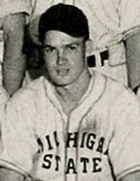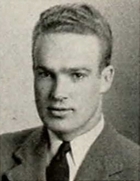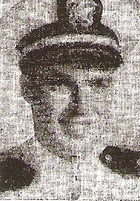Norm Duncan
| Date and Place of Birth: | January 28, 1920 Mayville, MI |
| Date and Place of Death: | April 12, 1945 off coast of Okinawa, Pacific Ocean |
| Baseball Experience: | Minor League |
| Position: | Shortstop |
| Rank: | Lieutenant (jg) |
| Military Unit: | US Navy |
| Area Served: | Pacific Theater of Operations |
Norman J. Duncan, the son of William and Anna Duncan, was born in Mayville, Michigan, a small village
about 80 miles north of Detroit. A tall, handsome young man, he seemed
to excel at whatever endeavor he undertook and this was especially true
of baseball. Duncan attended Mayville High School where he was an
outstanding shortstop and the school enjoyed championship years
throughout his time there.
Duncan went on to captain the baseball team at Michigan State College
(later Michigan State University). He led the Spartans in hitting in
1939, with a .341 batting average, and raised that figure to a team best
.398 in 1940. In 1941, he hit .301 and attracted a lot of interest from
major league clubs. Duncan and fellow Michigan State player Casimir
“Casey” Klewicki entered into talks with St. Louis Browns’ scout Jack
Fournier shortly before graduation in May 1941, but caused controversy
when they both worked out with the Philadelphia Athletics before a game
in Detroit. Fournier claimed they had signed with the Browns, while the
players stated they had merely discussed the possibility and had not
signed anything. Nevertheless, on June 26, 1941, Duncan and Klewicki
signed with the Browns and joined the St. Joseph Autos of the Class C
Michigan State League.
In their debut against Muskegon the following night, Duncan had a single
and two walks in the lead-off spot, while Klewicki, playing third base
and batting second, had four singles in six trips to the plate. Both
players enjoyed strong rookie seasons. Duncan batted .277 in 66 games
with 35 RBIs and four home runs, while Klewicki batted .261 in 63 games
with 34 RBIs and six home runs.
Duncan returned to Michigan State in the fall of 1941, for post graduate
work and also served as assistant baseball coach. He was sold to the
Cincinnati Reds’ organization for the 1942 season but military service
called and he attended the Navy’s Officer Training School in Chicago,
from which he graduated as an ensign. Promoted to lieutenant junior
grade, Duncan served on board the escort destroyer USS Whitehurst
(DE-634) as an Anti-Submarine Warfare (ASW) Officer, interpreting data
and determining changes of course and speed, as the ship hunted for
enemy submarines.
The Whitehurst put to sea in November 1943, and performed a variety of
escort duties in the Pacific. At the beginning of April 1945, she was
involved in vital screening duties off the southwest coast of Okinawa
during the invasion of the island. At 2:30 P.M., on April 12, 1945, four
Japanese Aichi D3A “Val” dive-bombers approached the Whitehurst from the
south. One plane detached itself from the group and headed for the
destroyer. It circled and then commenced a steep dive in a kamikaze
attack, somehow getting through the anti-aircraft fire and crashing into
the ship’s forward superstructure, penetrating the bulkheads and
starting fires that enveloped the entire bridge.
Duncan’s battle station was the SONAR Shack, which was a very small
compartment on the face of the ship’s superstructure just forward of the
bridge. The plane—packed with explosives—passed through the Combat
Information Center and the Pilot House, which was directly below the
SONAR Shack. It is not known whether Duncan was killed at this time or
jumped overboard to escape the inferno, but his was body was never
recovered. Of the crew of 189 men, 42 were dead or missing and over 40
were seriously burned or injured. The Whitehurst eventually limped back
to Hawaii for repairs.
Norman Duncan is memorialized at the Manila American Cemetery at Fort
Bonifacio in the Philippines and at the Watertown Township Cemetery in
Fostoria, Michigan. He was awarded the Commendation Ribbon for
his service as ASW Officer that led to the successful attack upon a
Japanese submarine.
In his hometown of Mayville, the Norman Duncan Memorial Award was
donated by his former schoolmate George Foster shortly after the war.
The award continues to be given to the outstanding senior athlete based
on an accumulated criteria of athletics, academics and citizenship over
their four years in high school.
|
Year |
Team |
League |
Class |
G |
AB |
R |
H |
2B |
3B |
HR |
RBI |
AVG |
| 1941 | St. Joseph | Michigan State | C | 66 | 289 | 63 | 80 | 19 | 4 | 4 | 35 | .277 |
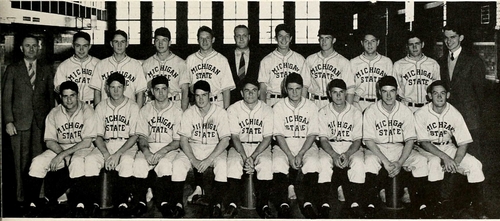
Norm Duncan (front row, fourth from left) with the Michigan State baseball team in 1941
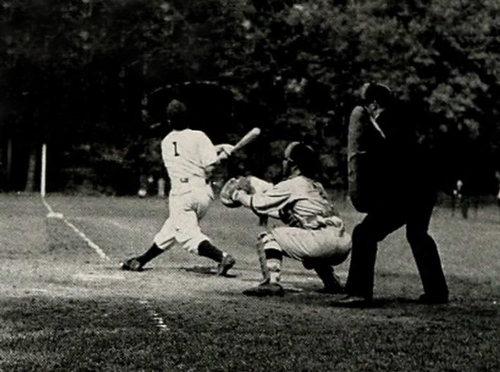
Norm Duncan taking a swing with Michigan State in 1941
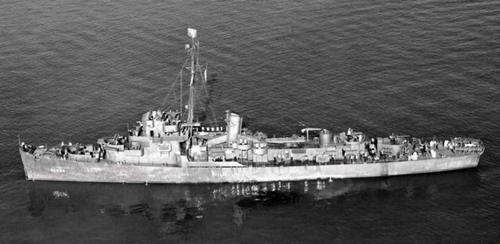
The escort destroyer USS Whitehurst (DE-634)
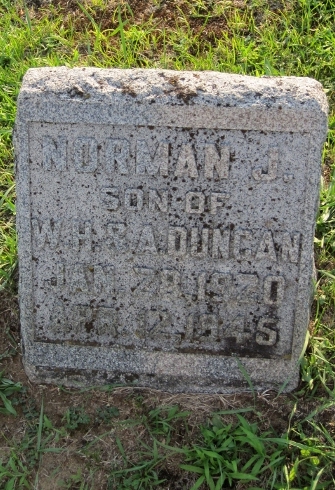
Norman Duncan's marker at the Watertown Township Cemetery in Fostoria, Michigan
Thanks to Norm Duncan's son, Norm Jr, and Max Crow, USS Whitehurst expert and webmaster of www.whitehurst.org for their help with this biography. Thanks also to Astrid van Erp for help with photos for this biography
Date Added January 27, 2012 Updated August 2, 2017
Baseball's Greatest Sacrifice is associated with Baseball Almanac
Baseball's Greatest Sacrifice is proud to be sponsored by

